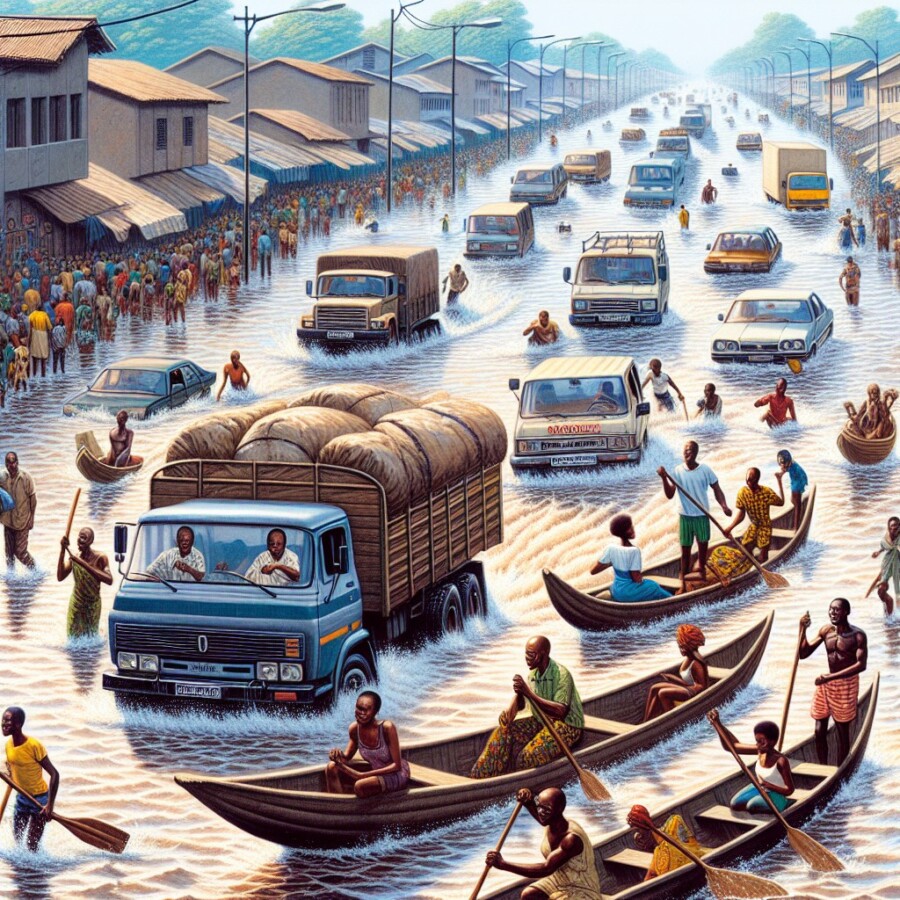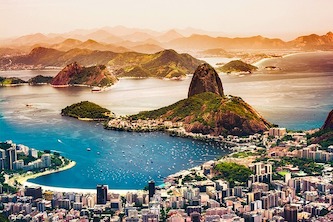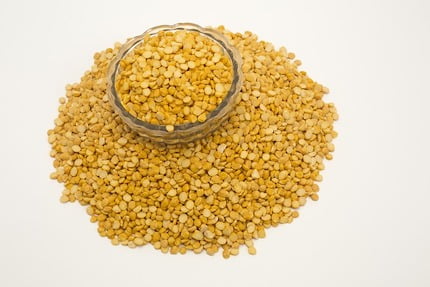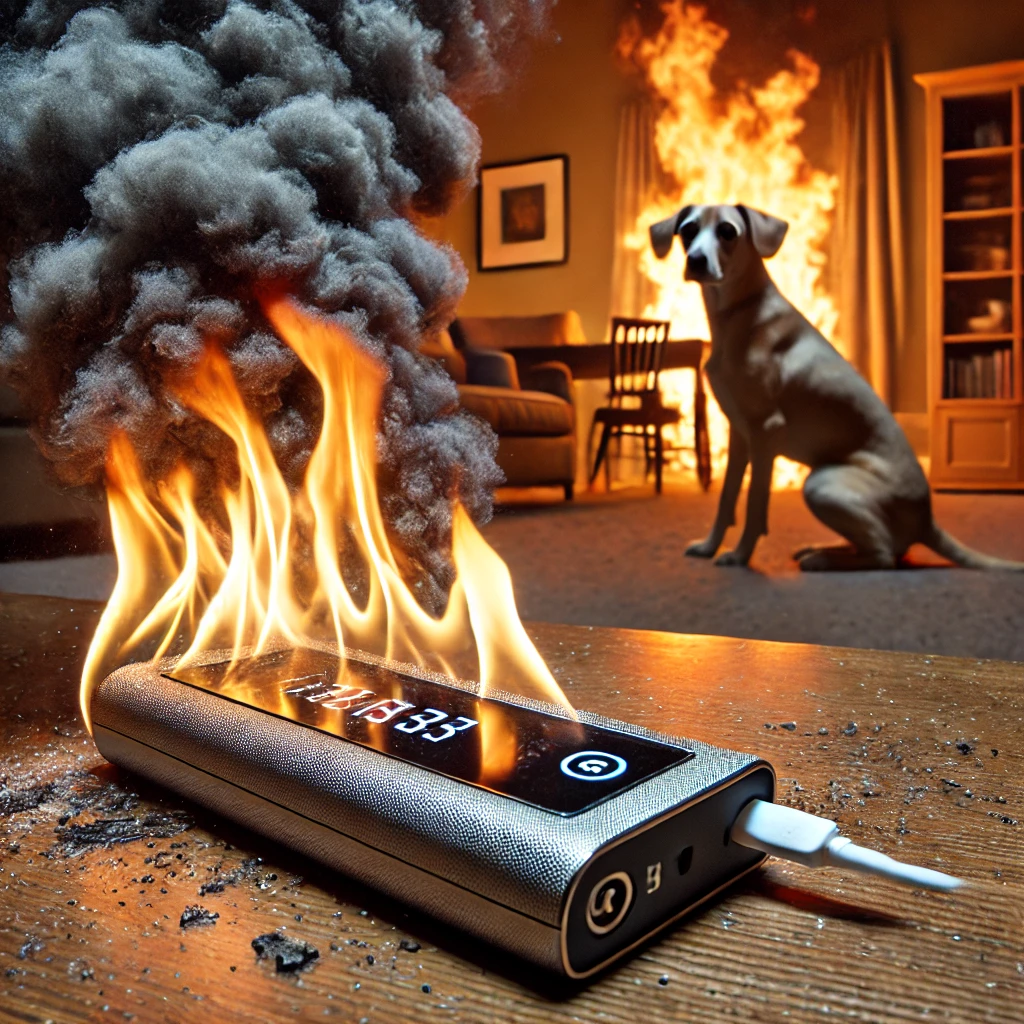Big water floods have hit Kinshasa, a big city in the Democratic Republic of Congo. The Congo River is higher than it has been in 60 years, and water is everywhere, even inside people’s houses. People are using boats instead of cars on the streets because they are full of water. Many people have died because of the water, and places like schools and hospitals have been destroyed.
Kinshasa has lots of little rivers that are very dirty and make the floods worse. The Congo River is almost as high as it was a long time ago in 1961. In another city called Kisangani, lots of houses are under water. The floods are also causing problems in a nearby country, hurting lots of people and making it hard for them to stay healthy.
The weather is changing and making it rain a lot, which causes the floods. When the air gets warmer, it can hold more water and then it rains really hard. Kinshasa had bad floods before, just last year, and many people died then too.
Original news source: DR Congo floods: Chaos in Kinshasa as river rises to near-record level (BBC)
🎧 Listen:
Slow
Normal
Fast
📖 Vocabulary:
| 1 | Kinshasa | A big city in the country called the Democratic Republic of Congo |
| 2 | Democratic | When a country is run by a government that is chosen by the people |
| 3 | floods | When there is too much water and it covers the land |
| 4 | boats | Things that float on water that people can ride in |
| 5 | streets | Roads in a town or city where cars usually go |
| 6 | hospitals | Big buildings where sick or hurt people go to get help |
| 7 | destroyed | When something is broken so badly it can’t be used anymore |
| 8 | Kisangani | Another city in the Democratic Republic of Congo that is also having water problems |
| 9 | nearby | Close to the place you are talking about |
| 10 | changing | When something is not staying the same and keeps becoming different |
| 11 | warmer | When the air or temperature feels hot |
| 12 | healthier | Being in good shape and not sick |
Group or Classroom Activities
Warm-up Activities:
– News Summary
Instructions: Have students read the article and write a summary of the main points in their own words. They should focus on the cause and effects of the floods, as well as the impact on the people and infrastructure in Kinshasa.
– Vocabulary Pictionary
Instructions: Divide the class into pairs or small groups. Give each group a list of vocabulary words from the article (such as floods, destroyed, under water, etc.). One student from each group will choose a word and draw a quick picture to represent it, while the other students try to guess the word. The group with the most correct guesses wins.
– Opinion Poll
Instructions: Ask students to think about the article and form an opinion on whether or not they think the government should do more to prevent the floods in Kinshasa. Have them write down their opinion and then divide the class into groups to discuss their views. Each group should appoint a spokesperson to present their group’s opinion to the class.
– Pros and Cons
Instructions: Divide the class into two teams. One team will be assigned the task of listing the pros (positive aspects) of the floods in Kinshasa, while the other team lists the cons (negative aspects). Give them a few minutes to brainstorm and then have a class discussion where each team presents their list. Encourage students to think critically and consider different perspectives.
– Headline Creation
Instructions: Ask students to imagine they are journalists reporting on the floods in Kinshasa. In small groups or individually, have them create a catchy headline for a news article about the floods. They should try to capture the attention of readers and summarize the main points of the article. Afterward, have students share their headlines and discuss why they chose them.
🤔 Comprehension Questions:
1. What has happened in Kinshasa recently?
2. Why are people using boats instead of cars on the streets?
3. What has happened to schools and hospitals because of the floods?
4. Why are the floods worse in Kinshasa?
5. What happened in Kisangani because of the floods?
6. Why are the floods causing problems in a nearby country?
7. Why is it raining a lot in Kinshasa?
Go to answers ⇩
🎧✍️ Listen and Fill in the Gaps:
Big water (1)______ have hit Kinshasa, a big city in the (2)______ Republic of Congo. The Congo River is higher than it has been in 60 (3)______, and water is everywhere, even inside people’s houses. People are using boats instead of cars on the streets because they are full of (4)______. Many people have died because of the water, and places like (5)______ and hospitals have been destroyed.
Kinshasa has lots of little rivers that are very dirty and make the floods (6)______. The Congo River is almost as (7)______ as it was a long time ago in 1961. In another city called Kisangani, lots of houses are under water. The floods are also causing problems in a (8)______ country, hurting lots of people and (9)______ it hard for them to stay healthy.
The weather is (10)______ and making it (11)______ a lot, which causes the floods. When the air (12)______ warmer, it can hold more water and then it rains really hard. Kinshasa had bad floods before, just last year, and many people died then too.
Go to answers ⇩
💬 Discussion Questions:
Students can ask a partner these questions, or discuss them as a group.
1. What is a flood?
2. How would you feel if your house was filled with water?
3. Do you like rainy weather? Why or why not?
4. Do you think the floods in Kinshasa are a big problem? Why or why not?
5. What do you think can be done to help the people affected by the floods?
6. How do you think the floods have affected the daily lives of the people in Kinshasa?
7. Have you ever experienced a natural disaster? If yes, how did it make you feel?
8. Do you think the government should do more to prevent floods in Kinshasa? Why or why not?
9. How do you think the floods have impacted the economy of Kinshasa?
10. What can individuals do to prepare for a flood?
11. How do you think the floods have affected the education of students in Kinshasa?
12. Do you think climate change is causing more frequent and severe floods? Why or why not?
Individual Activities
📖💭 Vocabulary Meanings:
Match each word to its meaning.
Words:
1. Kinshasa
2. Democratic
3. floods
4. boats
5. streets
6. hospitals
7. destroyed
8. Kisangani
9. nearby
10. changing
11. warmer
12. healthier
Meanings:
(A) When the air or temperature feels hot
(B) Another city in the Democratic Republic of Congo that is also having water problems
(C) Things that float on water that people can ride in
(D) Big buildings where sick or hurt people go to get help
(E) When something is not staying the same and keeps becoming different
(F) Roads in a town or city where cars usually go
(G) Being in good shape and not sick
(H) When something is broken so badly it can’t be used anymore
(I) A big city in the country called the Democratic Republic of Congo
(J) When there is too much water and it covers the land
(K) When a country is run by a government that is chosen by the people
(L) Close to the place you are talking about
Go to answers ⇩
🔡 Multiple Choice Questions:
1. What city in the Democratic Republic of Congo is experiencing big water floods?
(a) Kinshasa
(b) Kisangani
(c) Berlin
(d) London
2. Why are people using boats instead of cars in Kinshasa?
(a) The cars are broken
(b) The streets are full of water
(c) The boats are faster
(d) The cars are too expensive
3. What is causing the floods in Kinshasa?
(a) The dirty rivers in the city
(b) The high Congo River
(c) The weather changing and heavy rain
(d) The broken houses and buildings
4. How long has it been since the Congo River was last this high?
(a) 10 years
(b) 30 years
(c) 100 years
(d) 60 years
5. What happened to schools and hospitals in Kinshasa because of the floods?
(a) They were moved to higher ground
(b) They were destroyed
(c) They were closed for repairs
(d) They were not affected
6. What problems are the floods causing in a nearby country?
(a) Making the rivers cleaner
(b) Bringing more tourists to the country
(c) Improving the country’s economy
(d) Hurting lots of people and making it hard for them to stay healthy
7. What happens when the air gets warmer?
(a) It can hold more water and then it rains really hard
(b) It becomes colder and drier
(c) It causes earthquakes
(d) It creates strong winds
8. When did Kinshasa have bad floods before?
(a) 10 years ago
(b) 50 years ago
(c) Just last year
(d) It has never had bad floods before
Go to answers ⇩
🕵️ True or False Questions:
1. No people have lost their lives because of the floods, and important places like schools and hospitals have been destroyed.
2. The Congo River is almost as high as it was in 1961, causing more flooding in the city.
3. Due to the flooded streets, people are using boats instead of cars to get around in Kinshasa.
4. Another city called Kisangani is also experiencing floods, with many houses being submerged in water.
5. The floods in Kinshasa are made worse by the presence of dirty little rivers in the city.
6. The floods are not affecting a neighboring country as well, causing difficulties for the people and their health.
7. The floods have not caused water to enter people’s houses, making it difficult for them to live there.
8. Kinshasa, a city in the Democratic Republic of Congo, is not experiencing big floods caused by the Congo River being higher than it has been in 60 years.
Go to answers ⇩
📝 Write a Summary:
Write a summary of this news article in two sentences.
Check your writing now with the best free AI for English writing!
Writing Questions:
Answer the following questions. Write as much as you can for each answer.
Check your answers with our free English writing assistant!
1. What is happening in Kinshasa because of the big water floods?
2. Why are people using boats instead of cars on the streets?
3. What has been destroyed because of the floods?
4. Why are the floods worse in Kinshasa?
5. Why is the weather causing the floods?
✅ Answers
🤔✅ Comprehension Question Answers:
1. What has happened in Kinshasa recently?
There have been big water floods in Kinshasa recently.
2. Why are people using boats instead of cars on the streets?
People are using boats instead of cars on the streets because the streets are full of water.
3. What has happened to schools and hospitals because of the floods?
Schools and hospitals have been destroyed because of the floods.
4. Why are the floods worse in Kinshasa?
The floods are worse in Kinshasa because there are lots of little dirty rivers that make the floods worse.
5. What happened in Kisangani because of the floods?
In Kisangani, lots of houses are under water because of the floods.
6. Why are the floods causing problems in a nearby country?
The floods are causing problems in a nearby country because they are hurting lots of people and making it hard for them to stay healthy.
7. Why is it raining a lot in Kinshasa?
It is raining a lot in Kinshasa because the weather is changing and when the air gets warmer, it can hold more water and then it rains really hard.
Go back to questions ⇧
🎧✍️✅ Listen and Fill in the Gaps Answers:
(1) floods
(2) Democratic
(3) years
(4) water
(5) schools
(6) worse
(7) high
(8) nearby
(9) making
(10) changing
(11) rain
(12) gets
Go back to questions ⇧
📖💭✅ Vocabulary Meanings Answers:
1. Kinshasa
Answer: (I) A big city in the country called the Democratic Republic of Congo
2. Democratic
Answer: (K) When a country is run by a government that is chosen by the people
3. floods
Answer: (J) When there is too much water and it covers the land
4. boats
Answer: (C) Things that float on water that people can ride in
5. streets
Answer: (F) Roads in a town or city where cars usually go
6. hospitals
Answer: (D) Big buildings where sick or hurt people go to get help
7. destroyed
Answer: (H) When something is broken so badly it can’t be used anymore
8. Kisangani
Answer: (B) Another city in the Democratic Republic of Congo that is also having water problems
9. nearby
Answer: (L) Close to the place you are talking about
10. changing
Answer: (E) When something is not staying the same and keeps becoming different
11. warmer
Answer: (A) When the air or temperature feels hot
12. healthier
Answer: (G) Being in good shape and not sick
Go back to questions ⇧
🔡✅ Multiple Choice Answers:
1. What city in the Democratic Republic of Congo is experiencing big water floods?
Answer: (a) Kinshasa
2. Why are people using boats instead of cars in Kinshasa?
Answer: (b) The streets are full of water
3. What is causing the floods in Kinshasa?
Answer: (c) The weather changing and heavy rain
4. How long has it been since the Congo River was last this high?
Answer: (d) 60 years
5. What happened to schools and hospitals in Kinshasa because of the floods?
Answer: (b) They were destroyed
6. What problems are the floods causing in a nearby country?
Answer: (d) Hurting lots of people and making it hard for them to stay healthy
7. What happens when the air gets warmer?
Answer: (a) It can hold more water and then it rains really hard
8. When did Kinshasa have bad floods before?
Answer: (c) Just last year
Go back to questions ⇧
🕵️✅ True or False Answers:
1. No people have lost their lives because of the floods, and important places like schools and hospitals have been destroyed. (Answer: False)
2. The Congo River is almost as high as it was in 1961, causing more flooding in the city. (Answer: True)
3. Due to the flooded streets, people are using boats instead of cars to get around in Kinshasa. (Answer: True)
4. Another city called Kisangani is also experiencing floods, with many houses being submerged in water. (Answer: True)
5. The floods in Kinshasa are made worse by the presence of dirty little rivers in the city. (Answer: True)
6. The floods are not affecting a neighboring country as well, causing difficulties for the people and their health. (Answer: False)
7. The floods have not caused water to enter people’s houses, making it difficult for them to live there. (Answer: False)
8. Kinshasa, a city in the Democratic Republic of Congo, is not experiencing big floods caused by the Congo River being higher than it has been in 60 years. (Answer: False)
Go back to questions ⇧














